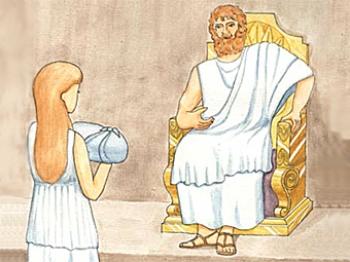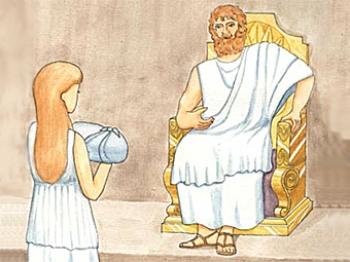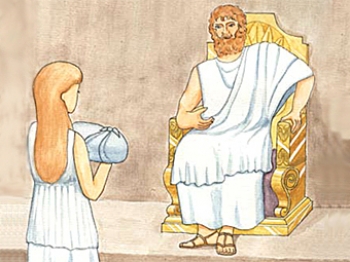Many already know that the Olympics originated in ancient Greece; but the actual, original origin remains unknown today, lost in the mists of time. However, many legends and myths do survive that offer different accounts of how the Games began. In the tradition of Greek mythology, these are stories where man and the divine walk the world together in close contact. The Greeks used these myths to pass on their history, teach lessons, or explain some natural phenomena. Of the stories about the origins of the Olympic Games, three are by far the most popular.
First Legend: Zeus
The first legend tells the creation of the universe and a war for control over all of heaven and Earth. The Greeks believe that before time and the universe existed, there was Chaos. Chaos was a formless nothingness, a dark void of empty space. Eventually Chaos gave birth to the Titan known as Gaia, the Earth. She then in turn gave birth to Uranus, the Sky, to be her equal and cover her. Joined together they then gave birth to more Titans: the Ocean, Intelligence, the Stars and the Wind, Rivers, the Sun, the Moon, the Dawn, Memory, Fate, and Rhea who was destined to become mother of the gods.
The youngest Titan was named Cronus. He would one day overthrow his father Uranus and make himself ruler of all things and father to the gods. Uranus hated all of his children and when Gaia gave birth to a race of giants, Cyclops, and monsters, he trapped them deep inside the Earth. This caused Gaia much grief, so she created a blade and gave it to Cronus to use against his father. Using the blade Cronus castrated Uranus and declared himself ruler over heaven and earth. He then took his sister Rhea to be his wife. However, all was not well, as it was prophesied that one day Cronus’ children would rise and overthrow him in the way he had done to his own father. Needless to say he was not very happy when Rhea became pregnant. She gave birth to five children: Hestia, Demeter, Hera, Hades, and Poseidon. After each was born Cronus promptly swallowed them whole to ensure that they would not rise up against him.
But when Rhea gave birth to their sixth son, Zeus, she hid him away on the Island of Crete and wrapped a stone in his swaddling clothes. Mistaking the stone for the child, Cronus swallowed the rock without knowing. Free from the fate of his siblings, Zeus was raised by Gaia until he came of age, at which point he returned home to liberate his brothers and sisters. He tricked Cronus into drinking an elixir that made him vomit up all his children. Following this, a massive war erupted between the Titans and gods for control of the universe. Eventually the gods were able to subdue the Titans and imprison them in the deepest darkest places of the universe.
The final battle happened at Olympia where Zeus and Cronus met to battle. They wrestled for a great deal of time until Zeus was able to subdue his father. With this the war was over and the gods declared themselves rulers of the universe. To commemorate his victory, Zeus established the Olympic Games at Olympia so all would remember his match with Cronus.








